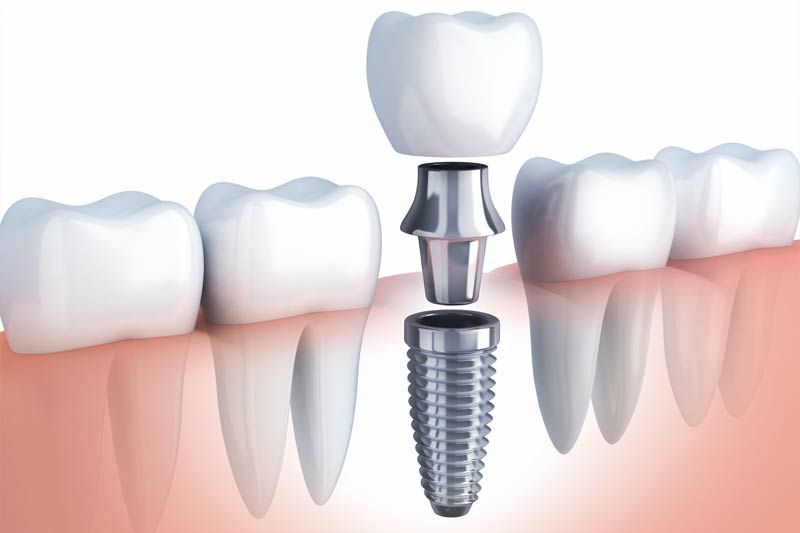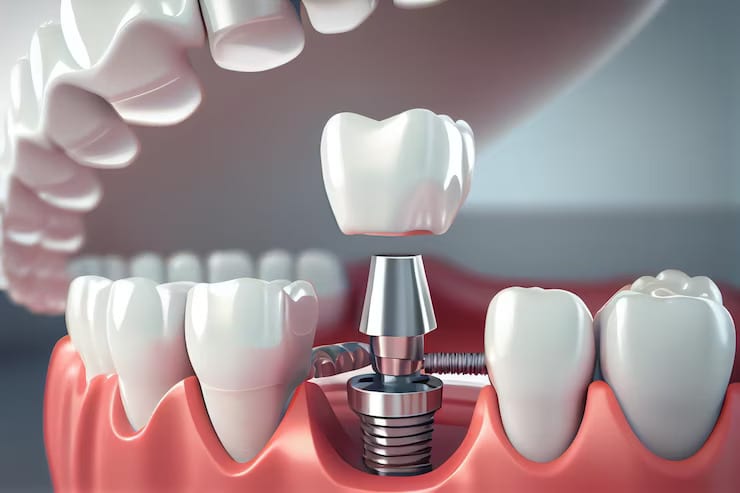Dental Center Centerburg OH The Advantages, Risks, and Insurance for Dental Implants
Dental Center Centerburg OH The Advantages, Risks, and Insurance for Dental Implants
Blog Article
Mono Implants Galena OH Full Mouth Dental Implants: An In-Depth Overview
Dental implants have emerged as a well-liked selection for individuals seeking a long-term resolution to tooth loss. One important facet of understanding dental implants involves their effect on adjacent teeth. This is especially necessary for guaranteeing the health and longevity of the whole dental structure.
When a dental implant is placed, it mimics the function of a natural tooth root. By doing so, it helps preserve the integrity of the encompassing bone structure. Natural teeth rely on a balanced, interconnected system for assist, and dental implants can contribute positively to that dynamic. The stability offered by the implant allows for higher distribution of chew forces, which can prevent undue stress on adjacent teeth.
Dentist Office Granville OH Dental Implant Recovery
In circumstances the place a tooth is missing, the neighboring teeth may shift into the vacant area. This shifting can result in misalignment and varied different issues. By placing a dental implant, the danger of this shifting is lowered, because the implant acts as a placeholder that preserves the natural alignment of surrounding teeth. This preventive effect is crucial for long-term oral health and performance.
Another important consideration is bone loss. When a tooth is misplaced, the jawbone within the space can start to deteriorate as a result of a lack of stimulation. Dental implants assist prevent this bone loss by providing the necessary stimulation to the jawbone, much like a natural tooth root would. This preservation of bone not solely helps the implant itself but additionally contributes to the stability of adjacent teeth.
The type of material used in dental implants, sometimes titanium, has a singular property of osseointegration, meaning it fuses with the bone over time. This integration provides a sturdy foundation for the artificial tooth while ensuring that the implant doesn’t negatively affect surrounding structures. As the implant integrates, it creates an setting that contributes positively to the health of the adjacent teeth.

Regular dental check-ups play a vital position in monitoring the influence of dental implants on adjacent teeth. Professional assessments may help identify any issues that will come up, ensuring prompt therapy and sustaining the health of the entire dental arch. These evaluations may embody X-rays to verify for bone density and the general condition of the implant and surrounding teeth.
Family Dental Clinic Pataskala OH Dental Implants for Seniors: Considerations and Benefits
Oral hygiene practices are very important for individuals with dental implants. Proper brushing and flossing habits not solely contribute to the longevity of the implant but additionally make positive that adjacent teeth remain wholesome. Food particles and plaque that accumulate around the implant may cause problems, together with peri-implantitis, an inflammatory condition that may affect surrounding teeth and tissues.
The positioning of dental implants can influence the health of adjacent teeth. If an implant is placed at an angle or not correctly aligned, it might lead to elevated strain on neighboring teeth. This misalignment might cause put on and tear on adjacent enamel, probably leading to cavities or other dental points. Therefore, the skill and expertise of the dentist performing the implant process are paramount in attaining a profitable end result.
In some instances, additional procedures could also be essential to arrange the encompassing area for an implant. Bone grafting or sinus lifts can help create a greater surroundings for the implant. While these procedures are aimed at enhancing the positioning for the implant, in addition they serve to guard the health of adjacent teeth by creating a more steady foundation.
Mono Implants Hartford OH Dental Implants: Services and Expertise

As dental technology evolves, developments in implant methods result in higher outcomes. Improved imaging techniques and computer-aided design enable for more exact placements that reduce risk to adjacent teeth. With these developments, the probability of complications that would come up from improperly placed implants diminishes considerably.
Post-operative care also performs a crucial role in making certain that adjacent teeth remain unaffected. Patients should adhere to the dentist's instructions relating to food plan, oral hygiene, and follow-up visits. Neglecting these tips could result in complications that impression not only the implant but additionally the neighboring teeth.
Premier Dental Sunbury OH Full Mouth Dental Implants: A Comprehensive Solution
In conclusion, dental implants, when positioned accurately and cared for correctly, have the potential to boost the health of adjacent teeth somewhat than detract from it. They preserve alignment, stimulate bone development, and provide a secure foundation that supports the entire dental structure. Understanding how dental implants have an effect on adjacent teeth emphasizes their importance as a long-term tooth replacement solution. With steady developments in expertise and strategies, the combination of dental implants into restorative dentistry is changing into more and more successful, making certain healthy and functional smiles for years to come.

- Dental implants prevent adjacent teeth from shifting into the hole created by a missing tooth, serving to to take care of proper alignment within the mouth.
- The rebuilding of the jawbone by way of an implant can stimulate surrounding teeth and keep them healthy by providing needed bone density that might otherwise diminish.
- Adjacent teeth benefit from the stabilization that dental implants provide, decreasing the chance of damage and tear from misalignment during chewing.
- Implants can shield adjacent teeth by performing as a framework, which might distribute bite forces evenly across the dental arch as an alternative of putting undue stress on neighboring teeth.
- When positioned accurately, dental implants minimize the danger of gum disease which might affect adjacent teeth by maintaining a clean and healthy gum line.
- The presence of an implant can facilitate an improved oral hygiene routine, as it eliminates the need for bridgework that would lure food particles round adjacent teeth.
- Regular dental check-ups can reveal how properly the implant integrates with surrounding buildings, guaranteeing ongoing health for adjacent teeth.
- Implants can prevent the natural strategy of bone resorption that happens after tooth loss, positively impacting the steadiness and longevity of adjacent teeth.
- The use of dental implants may scale back the need for extra invasive procedures sooner or later, offering a long-term answer that maintains the structure of the whole dental arch.
- Successful integration of an implant into the dental arch enhances general oral perform, typically resulting in improved confidence and oral health for adjacent teeth.undefinedHow do dental implants have an effect on adjacent teeth?
What impact do dental implants have on the alignment of adjacent teeth?
Dental implants generally prevent the shifting of adjacent teeth, helping to maintain proper alignment. This stability can reduce the risk of growing chunk points over time.
Can dental implants trigger injury to nearby teeth?
When placed accurately by a certified skilled, dental implants shouldn't injury adjacent teeth - Dental Care Associate Granville OH. However, improper placement or insufficient planning might lead to complications
Orthodontics Pataskala OH Understanding Dental Implants: A Comprehensive Guide
Do dental implants require any particular care concerning adjacent teeth?
Maintaining good oral hygiene is crucial. Surrounding teeth must be brushed and flossed frequently, and routine dental check-ups will help make positive that both the implants and adjacent teeth stay wholesome.

Will dental implants impact the health of my surrounding teeth?
Dental implants can improve the health of surrounding teeth by distributing chew forces evenly, lowering put on and tear. Additionally, they can prevent bone loss in the jaw, which may have an result on adjacent teeth.
Orthodontics Centerburg OH Dental Implant Benefits
Are there any long-term results of dental implants my explanation on close by teeth?
Long-term, dental implants might help preserve the health of adjacent teeth by stopping shifting and potential gum issues, ultimately contributing to higher oral health general. - Dental Implants Johnstown OH
Can gum problems come up around adjacent teeth after getting implants?
If correct dental care is neglected, gum points might develop round both the implants and adjacent teeth. Following post-operative care instructions is important to minimize these risks.
Dentist Hartford OH Types of Dental Implants
How do dental implants compare to bridges in terms of find more info adjacent teeth?
Dental implants are sometimes helpful as they don’t require alteration of adjacent teeth, in distinction to bridges, which necessitate reshaping of close by teeth for support. (Dentist Office Alexandria OH)
Can I still get cavities in adjacent teeth if I even have Recommended Site dental implants?
Yes, adjacent teeth can still develop cavities if not properly cared for. Dental implants themselves can't get cavities, however they require vigilant hygiene practices to guard surrounding natural teeth.
What is the success rate of dental implants in relation to surrounding teeth?
The success rate of dental implants is excessive, however it largely is decided by the standard of the process and ongoing care. Well-maintained implants typically lead to better outcomes for adjacent teeth as well.